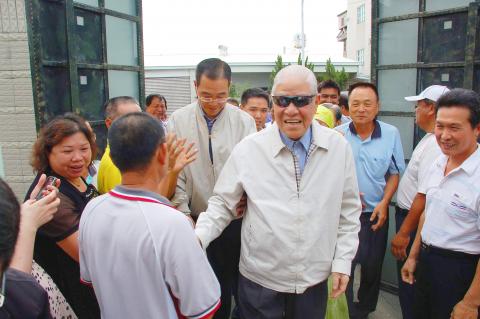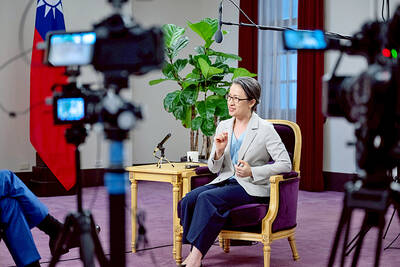Former president Lee Teng-hui (李登輝) yesterday reiterated that the “one country, two areas” proposal was President Ma Ying-jeou’s (馬英九) inaccurate interpretation of Taiwan’s history and its decades-long democratic development.
“The proposal was a reaction against democracy and a sign of the re-emergence of authoritarianism,” Lee said in Donggang Township (東港), Pingtung County, on the first day of his three-day visit to southern Taiwan.
The controversial proposal, which was put forward by former Chinese Nationalist Party (KMT) chairman Wu Poh-hsiung (吳伯雄) during his meeting with Chinese President Hu Jintao (胡錦濤) on March 22 in Beijing, inaccurately implied that Taiwan and China are two administrative areas of the same country, Lee said.

Photo: Lee Li-fa, Taipei Times
While Ma cited an amendment of the Republic of China (ROC) Constitution and the Act Governing Relations Between the People of the Taiwan Area and the Mainland Area (臺灣地區與大陸地區人民關係條例) as the legal basis of his initiative, Lee said Ma got the history wrong.
Since the temporary provisions effective during the period of mobilization for the suppression of the Communist rebellion (動員戡亂時期臨時條款) ceased to function on May 1, 1991, Taiwan and China have been considered as “two political entities,” Lee said.
The Act Governing Relations Between the People of the Taiwan Area and the Mainland Area was only a domestic law to deal with cross-strait exchanges, he added.
The 88-year-old Lee said it was “not right” that Wu, who served as secretary-general of the Presidential Office under him, spoke as he did and that Ma had been “pathetic” in irresponsibly submitting the proposal.
Lee spoke for 30 minutes on modern Taiwan history since 1895, saying it was crucial to understand history before making deliberations on cross-strait policies and “a large part of Taiwan history has been misinterpreted.”
He said he believed he was the best person to address the issue, because “there was no cross-strait policy before me” since former presidents Chiang Kai-shek (蔣介石) and Chiang Ching-kuo (蔣經國) both refused to recognize the existence of the People’s Republic of China and initiate contacts.
On the issue of recent fuel and electricity price hikes, Lee said it was inappropriate for him to criticize the president on this issue.
However, Lee said he would have put in more thought and policy deliberation before making such decisions.
“It’s not a good thing if [Ma] thinks he can do whatever he wants since he won his second term. A leader should never cheat his people,” Lee said.

China might accelerate its strategic actions toward Taiwan, the South China Sea and across the first island chain, after the US officially entered a military conflict with Iran, as Beijing would perceive Washington as incapable of fighting a two-front war, a military expert said yesterday. The US’ ongoing conflict with Iran is not merely an act of retaliation or a “delaying tactic,” but a strategic military campaign aimed at dismantling Tehran’s nuclear capabilities and reshaping the regional order in the Middle East, said National Defense University distinguished adjunct lecturer Holmes Liao (廖宏祥), former McDonnell Douglas Aerospace representative in Taiwan. If

TO BE APPEALED: The environment ministry said coal reduction goals had to be reached within two months, which was against the principle of legitimate expectation The Taipei High Administrative Court on Thursday ruled in favor of the Taichung Environmental Protection Bureau in its administrative litigation against the Ministry of Environment for the rescission of a NT$18 million fine (US$609,570) imposed by the bureau on the Taichung Power Plant in 2019 for alleged excess coal power generation. The bureau in November 2019 revised what it said was a “slip of the pen” in the text of the operating permit granted to the plant — which is run by Taiwan Power Co (Taipower) — in October 2017. The permit originally read: “reduce coal use by 40 percent from Jan.

‘SPEY’ REACTION: Beijing said its Eastern Theater Command ‘organized troops to monitor and guard the entire process’ of a Taiwan Strait transit China sent 74 warplanes toward Taiwan between late Thursday and early yesterday, 61 of which crossed the median line in the Taiwan Strait. It was not clear why so many planes were scrambled, said the Ministry of National Defense, which tabulated the flights. The aircraft were sent in two separate tranches, the ministry said. The Ministry of Foreign Affairs on Thursday “confirmed and welcomed” a transit by the British Royal Navy’s HMS Spey, a River-class offshore patrol vessel, through the Taiwan Strait a day earlier. The ship’s transit “once again [reaffirmed the Strait’s] status as international waters,” the foreign ministry said. “Such transits by

Taiwan is doing everything it can to prevent a military conflict with China, including building up asymmetric defense capabilities and fortifying public resilience, Vice President Hsiao Bi-khim (蕭美琴) said in a recent interview. “Everything we are doing is to prevent a conflict from happening, whether it is 2027 or before that or beyond that,” Hsiao told American podcaster Shawn Ryan of the Shawn Ryan Show. She was referring to a timeline cited by several US military and intelligence officials, who said Chinese President Xi Jinping (習近平) had instructed the Chinese People’s Liberation Army to be ready to take military action against Taiwan